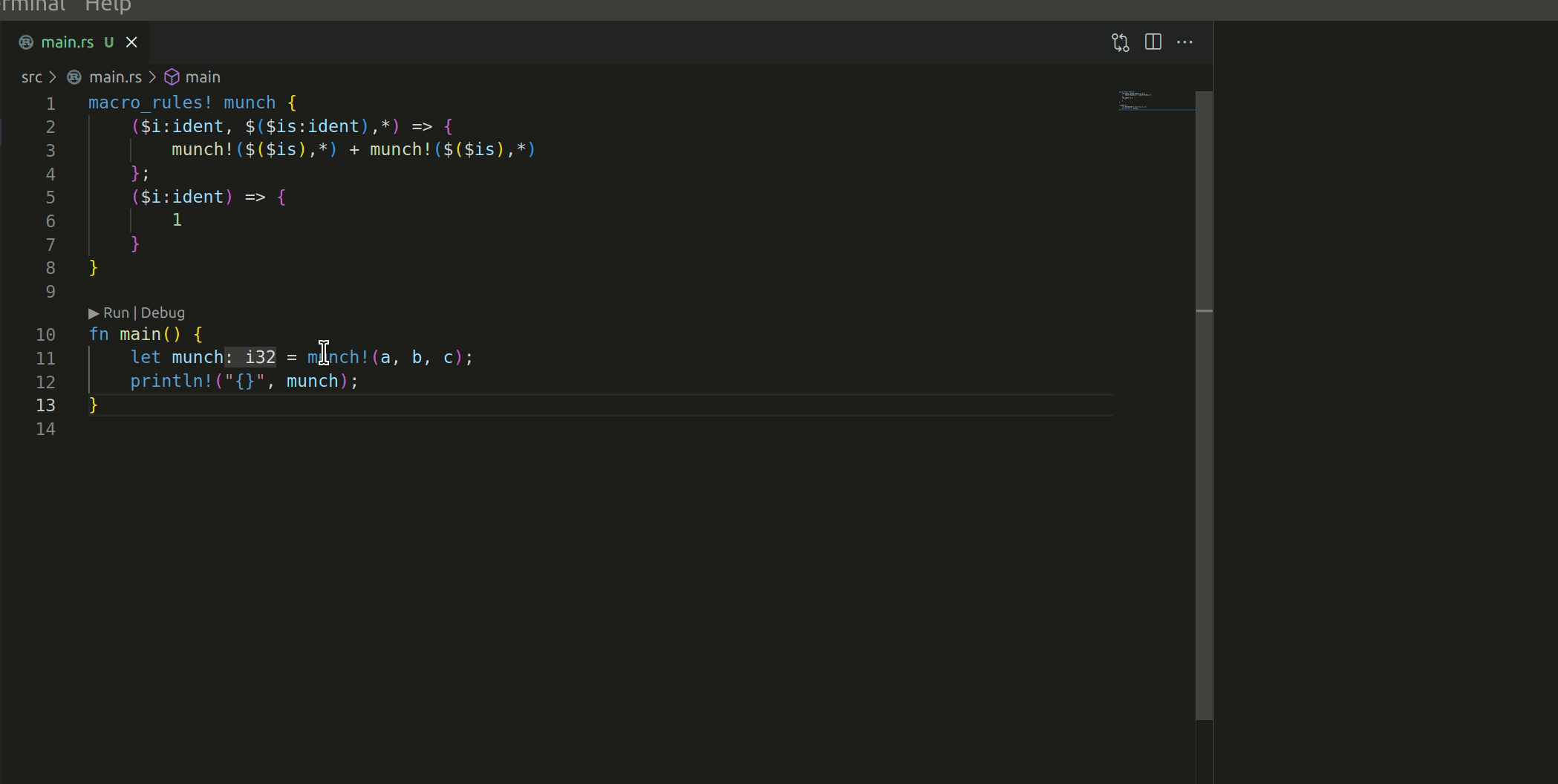Add action to expand a declarative macro once, inline. Fixes#13598
This commit adds a new r-a method, `expandMacroInline`, which expands the macro that's currently selected. See #13598 for the most applicable issue; though I suspect it'll resolve part of #5949 and make #11888 significantly easier).
The macro works like this:

I have 2 questions before this PR can be merged:
1. **Should we rustfmt the output?** The advantage of doing this is neater code. The disadvantages are we'd have to format the whole expr/stmt/block (since there's no point just formatting one part, especially over multiple lines), and maybe it moves the code around more in weird ways. My suggestion here is to start off by not doing any formatting; and if it appears useful we can decide to do formatting in a later release.
2. **Is it worth solving the `$crate` hygiene issue now?** -- I think this PR is usable as of right now for some use-cases; but it is annoying that many common macros (i.e. `println!()`, `format!()`) can't be expanded further unless the user guesses the correct `$crate` value. The trouble with solving that issue is that I think it's complicated and imperfect. If we do solve it; we'd also need to either change the existing `expandMacro`/`expandMacroInline` commands; provide some option to allow/disallow `$crate` expanding; or come to some other compromise.
fix: generate async delegate methods
Fixes a bug where the generated async method doesn't await the result before returning it.
This is an example of what the output looked like:
```rust
struct Age<T>(T);
impl<T> Age<T> {
pub(crate) async fn age<J, 'a>(&'a mut self, ty: T, arg: J) -> T {
self.0
}
}
struct Person<T> {
age: Age<T>,
}
impl<T> Person<T> {
pub(crate) async fn age<J, 'a>(&'a mut self, ty: T, arg: J) -> T {
self.age.age(ty, arg) // .await is missing
}
}
```
The `.await` is missing, so the return type is `impl Future<Output = T>` instead of `T`
add wrapping/checked/saturating assist
This addresses #13452
I'm not sure about the structure of the code. I'm not sure if it needs to be 3 separate assists, and if that means it needs to be in 3 separate files as well.
Most of the logic is in `util.rs`, which feels funny to me, but there seems to be a pattern of 1 assist per file, and this seems better than duplicating the logic.
Let me know if anything needs changes 😁
fix a bunch of clippy lints
fixes a bunch of clippy lints for fun and profit
i'm aware of this repo's position on clippy. The changes are split into separate commits so they can be reviewed separately
This makes code more readale and concise,
moving all format arguments like `format!("{}", foo)`
into the more compact `format!("{foo}")` form.
The change was automatically created with, so there are far less change
of an accidental typo.
```
cargo clippy --fix -- -A clippy::all -W clippy::uninlined_format_args
```
Seems like these can be safely fixed. With one, I was particularly
surprised -- `Some(pats) => &**pats,` in body.rs?
```
cargo clippy --fix -- -A clippy::all -D clippy::explicit_auto_deref
```
I am not certain if this will improve performance,
but it seems having a .clone() without any need should be removed.
This was done with clippy, and manually reviewed:
```
cargo clippy --fix -- -A clippy::all -D clippy::redundant_clone
```
fix: make make_body respect comments in extract_function
Possible fix for #13621
### Points to help in review:
- Earlier we were only considering statements in a block expr and hence comments were being ignored, now we handle tokens hence making it aware of comments and then preserving them using `hacky_block_expr_with_comments`
Seems like I am not able to attach output video, github is glitching for it :(
feat: allow unwrap block in let initializers
Possible fix for #13679
### Points to help in review:
- I just added a parent case for let statements and it seems everything else was in place already, so turned out to be a small fix
fix: add fallback case in generated `PartialEq` impl
Partially fixes#13727.
When generating `PartialEq` implementations for enums, the original code can already generate the following fallback case:
```rs
_ => std::mem::discriminant(self) == std::mem::discriminant(other),
```
However, it has been suppressed in the following example for no good reason:
```rs
enum Either<T, U> {
Left(T),
Right(U),
}
impl<T, U> PartialEq for Either<T, U> {
fn eq(&self, other: &Self) -> bool {
match (self, other) {
(Self::Left(l0), Self::Left(r0)) => l0 == r0,
(Self::Right(l0), Self::Right(r0)) => l0 == r0,
// _ => std::mem::discriminant(self) == std::mem::discriminant(other),
// ^ this completes the match arms!
}
}
}
```
This PR has removed that suppression logic.
~~Of course, the PR could have suppressed the fallback case generation for single-variant enums instead, but I believe that this case is quite rare and should be caught by `#[warn(unreachable_patterns)]` anyway.~~
After this fix, when the enum has >1 variants, the following fallback arm will be generated :
* `_ => false,` if we've already gone through every case where the variants of `self` and `other` match;
* The original one (as stated above) in other cases.
---
Note: The code example is still wrong after the fix due to incorrect trait bounds.
Add assist to generate trait impl's
resolves#13553
This pull request adds a `generate_trait_impl` assist, which generates trait impl's for a type. It is almost the same as the one to generate impl's and I also reduced the trigger range to only outside the `RecordFieldList`. Also moved all the tests into separate test functions. A few of the old tests seemed redundant, so I didn't port them.